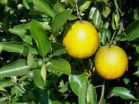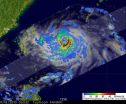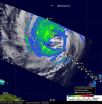(Press-News.org) LAKE ALFRED, FL—Successful mechanical harvesting of perennial fruit crops requires efficient, economical harvesting systems that do not reduce trees' production life or diminish fruit quality. Most of the world's citrus is now harvested manually, but the use of efficient and lower-cost mechanical harvesting techniques is expected to increase in the next few years, especially in the large citrus plantations in Florida and Brazil. The citrus industry is ramping up efforts to extend the harvest season past June, when the following year's crop becomes large enough to be susceptible to mechanical harvesting; discovering techniques that improve late-season harvesting will give growers better tools to minimize damaging impacts on the next year's fruit yield.
Researchers from the University of Florida's Citrus Research and Education Center published a study in a recent issue of HortScience that determined if winter drought stress could successfully delay flowering and fruit development of immature 'Valencia' sweet oranges to avoid young fruit loss during late-season mechanical harvesting.
The researchers hypothesized that if the Florida 'Valencia' bloom period could be delayed by a few weeks using winter drought stress—without negative effects on the quality of the current season's crop—the "fruitlets" from delayed flowering would be too small to be affected by mechanical harvesting late in the current harvest season, thus safely extending the mechanical harvesting period.
The study was designed by Juan Carlos Melgar, Jill M. Dunlop, L. Gene Albrigo, and James P. Syvertsen and conducted at the Citrus Research and Education Center in Lake Alfred. Beginning in December 2006 and continuing for three consecutive seasons, Tyvek® water-resistive barrier material was used as a rain shield groundcover under 13-year-old-trees. The researchers applied three treatments: drought (no irrigation and covered soil), rain only (no irrigation, no cover), and normal irrigation (rain and no cover). Covers were removed in February or March and normal irrigation and fertilization were resumed.
The drought stress did not affect fruit yield, size, percentage juice, or juice quality of the current crop harvested in May and June relative to continuously irrigated trees. Drought stress delayed flowering by 2 to 4 weeks so that the immature fruit for next season's crop were smaller than on continuously irrigated trees during June, but fruit growth caught up by September. During mechanical harvesting, previously drought-stressed trees lost fewer young fruit than continuously irrigated trees.
"The results showed that winter drought stress effectively delayed flowering and avoided young fruit loss during late-season mechanical harvesting without negative impacts on yield or fruit quality", Melgar noted.
The researchers observed that rain-excluding covers were used as an experimental tool, but that the covers may not be a viable commercial option for growers. They added that natural cover crops may help in inducing drought stress, but are yet to be tested as a management tool.
INFORMATION:
The complete study and abstract are available on the ASHS HortScience electronic journal web site: http://hortsci.ashspublications.org/cgi/content/abstract/45/2/271
Founded in 1903, the American Society for Horticultural Science (ASHS) is the largest organization dedicated to advancing all facets of horticultural research, education, and application. More information at ashs.org
Winter drought stress can delay flowering, prevent fruit loss in orange crops
Researchers discover technique to improve, extend late-season harvest
2010-09-21
ELSE PRESS RELEASES FROM THIS DATE:
NASA captures very heavy rain in Typhoon Fanapi and 2 landfalls
2010-09-21
Taiwan experienced a landfall and a soaking from Typhoon Fanapi, and NASA and JAXA's TRMM satellite noted a large area of very heavy rain in the system before it made landfall this weekend. NASA's Aqua and Terra satellites also captured impressive visible images of Fanapi just before the Taiwan landfall, and as it was making landfall in eastern China very early today.
The Tropical Rainfall Measuring Mission satellite known as TRMM captured an image of Typhoon Fanapi's rainfall on Sept. 18 at 0653 UTC (2:53 a.m. EDT) after the typhoon had intensified to 105 knots (~121 ...
Introducing 'Champagne', new disease-resistant fig
2010-09-21
BATON ROUGE, LA—The ancient fig tree, first imported to the United States during the 16th century, thrives in areas of California and the South Atlantic and Gulf Coast areas of the U.S. One of the most popular trees grown in Southern backyards, fig is favored for its versatile fruit and low-maintenance production.
Charles E. Johnson, Ed O'Rourke, and James E. Boudreaux, from the Louisiana State University Agricultural Center in Baton Rouge, introduced a new fig they named "Champagne" in a recent issue of HortScience. According to the report, the new fig performed well ...
NASA's MODIS and AIRS instruments watch Igor changing shape, warming over 3 days
2010-09-21
The Moderate Resolution Imaging Spectroradiometer or MODIS, is an instrument that flies on NASA's Aqua and Terra satellites and provides incredible views of tropical cyclones like Hurricane Igor, from its vantage point in space. Imagery from the MODIS instruments on these two satellites captured from Sept. 18 to 20 showed that powerful Hurricane Igor in the Atlantic Ocean is morphing from a rounded storm to more of a comma-shaped storm.
The MODIS instrument on NASA's Terra satellite captured a visible image of Igor at 11:30 am on Sept. 18, while MODIS in the Aqua satellite ...
Food for thought, er, well...
2010-09-21
Ever wonder why it's such an effort to forget about work while on vacation or to silence that annoying song that's playing over and over in your head?
Mathematicians at Case Western Reserve University may have part of the answer.
They've found that just as thinking burns energy, stopping a thought burns energy - like stopping a truck on a downhill slope.
"Maybe this explains why it is so tiring to relax and think about nothing," said Daniela Calvetti, professor of mathematics, and one of the authors of a new brain study. Their work is published in an advanced online ...
Low-calorie cheesecake? Why we have trouble estimating calories
2010-09-21
When it comes to estimating calorie counts, Americans aren't really on the ball. According to a new study in the Journal of Consumer Research, this may be because of the order in which we encounter the food.
"The sequence in which items are considered often influences our evaluations of these items," writes author Alexander Chernev (Northwestern University). "The focus on sequential estimation is important because many meals are ordered and consumed sequentially rather than at once. Moreover, to control their daily calorie intake, people often estimate not only the amount ...
Santa Fe homeowners weigh in on landscape preferences
2010-09-21
LAS CRUCES, NM—While municipalities may mandate communitywide water conservation measures, individuals—particularly homeowners—can make significant contributions to water conservation in urban environments. Hoping to provide urban planners with more information about how residents' landscape preferences affect municipal water supplies, a team from New Mexico State University surveyed homeowners in Santa Fe about their attitudes toward high desert plants. Rolston St. Hilaire, Dawn M. VanLeeuwen, and Patrick Torres reported on their study of residents' preferences for urban ...
Scientists uncover process enabling toxoplasmosis parasite to survive homelessness
2010-09-21
INDIANAPOLIS — The parasite responsible for toxoplasmosis requires a stress response system that helps it survive the move to infect new cells, Indiana University School of Medicine scientists have reported, a discovery that could lead to new treatments to control the disease.
Parasites such as Toxoplasma gondii invade host cells, replicate and then must exit to find new host cells to invade. Traveling outside their host cell exposes the parasites to environmental stresses that limit how long they can remain viable while searching for new host cells.
The researchers ...
Learning how consumers value products
2010-09-21
Suggesting to consumers that they will use a product frequently can actually reduce their interest in purchasing the product, according to a new study in the Journal of Consumer Research.
"When consumers estimate the value of a durable product, they consider not only the absolute number of times they think they will use the product, but also the number of time they will use the product relative to other consumers," write authors Rebecca W. Hamilton, Rebecca K. Ratner (both University of Maryland, College Park), and Debora Viana Thompson (Georgetown University).
The ...
Could learning self-control be enjoyable?
2010-09-21
When it comes to self-control, consumers in the United States are in trouble. But a new study in the Journal of Consumer Research says there's hope; we just need a little help to see self-regulation as fun.
"Self-control failures depend on whether people see activities involving self-control (e.g., eating in moderate quantities) as an obligation to work or an opportunity to have fun," write authors Juliano Laran (University of Miami) and Chris Janiszewski (University of Florida, Gainesville).
According to the authors, approximately one in five U.S. citizens over the ...
Windborne dust on high peaks dampens Colorado River runoff
2010-09-21
On spring winds, something wicked this way comes--at least for the mountains of the Colorado River Basin and their ecosystems, and for people who depend on snowmelt from these mountains as a regional source of water.
"More than 80 percent of sunlight falling on fresh snow is reflected back to space," says scientist Tom Painter of the Jet Propulsion Laboratory in Pasadena, Calif., and the University of California at Los Angeles. "But sprinkle some dark particles on the snow and that number drops dramatically."
The darker dust absorbs sunlight, reducing the amount of ...
LAST 30 PRESS RELEASES:
Study reveals insights about brain regions linked to OCD, informing potential treatments
Does ocean saltiness influence El Niño?
2026 Young Investigators: ONR celebrates new talent tackling warfighter challenges
Genetics help explain who gets the ‘telltale tingle’ from music, art and literature
Many Americans misunderstand medical aid in dying laws
Researchers publish landmark infectious disease study in ‘Science’
New NSF award supports innovative role-playing game approach to strengthening research security in academia
Kumar named to ACMA Emerging Leaders Program for 2026
AI language models could transform aquatic environmental risk assessment
New isotope tools reveal hidden pathways reshaping the global nitrogen cycle
Study reveals how antibiotic structure controls removal from water using biochar
Why chronic pain lasts longer in women: Immune cells offer clues
Toxic exposure creates epigenetic disease risk over 20 generations
More time spent on social media linked to steroid use intentions among boys and men
New study suggests a “kick it while it’s down” approach to cancer treatment could improve cure rates
Milken Institute, Ann Theodore Foundation launch new grant to support clinical trial for potential sarcoidosis treatment
New strategies boost effectiveness of CAR-NK therapy against cancer
Study: Adolescent cannabis use linked to doubling risk of psychotic and bipolar disorders
Invisible harms: drug-related deaths spike after hurricanes and tropical storms
Adolescent cannabis use and risk of psychotic, bipolar, depressive, and anxiety disorders
Anxiety, depression, and care barriers in adults with intellectual and developmental disabilities
Study: Anxiety, gloom often accompany intellectual deficits
Massage Therapy Foundation awards $300,000 research grant to the University of Denver
Gastrointestinal toxicity linked to targeted cancer therapies in the United States
Countdown to the Bial Award in Biomedicine 2025
Blood marker from dementia research could help track aging across the animal world
Birds change altitude to survive epic journeys across deserts and seas
Here's why you need a backup for the map on your phone
ACS Central Science | Researchers from Insilico Medicine and Lilly publish foundational vision for fully autonomous “Prompt-to-Drug” pharmaceutical R&D
Increasing the number of coronary interventions in patients with acute myocardial infarction does not appear to reduce death rates
[Press-News.org] Winter drought stress can delay flowering, prevent fruit loss in orange cropsResearchers discover technique to improve, extend late-season harvest





